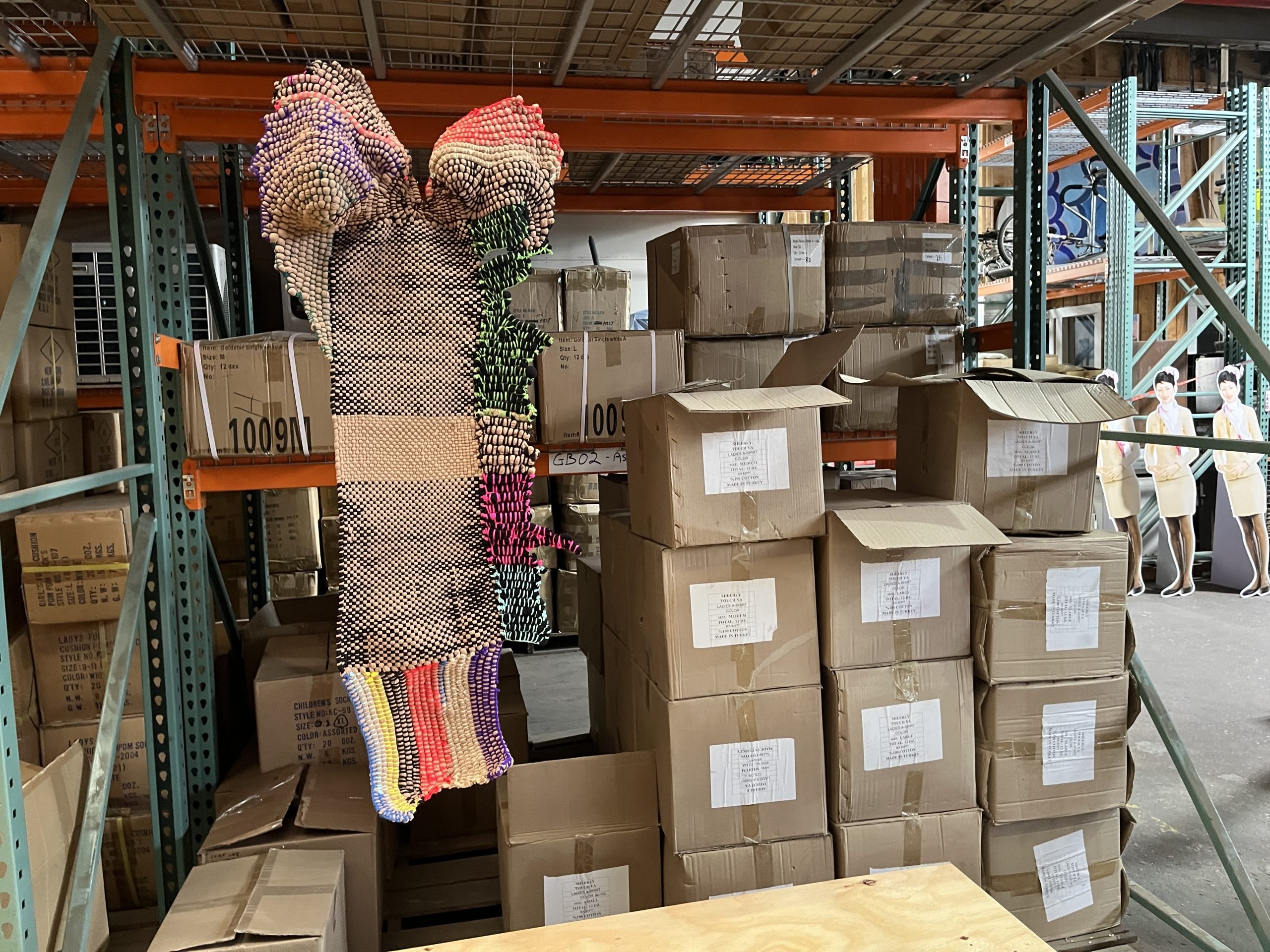
Without hosiery, contemporary art would be a great deal poorer. For decades, Senga Nengudi has stretched pantyhose into inventive sculptures, Sarah Lucas has dressed uncanny human figures in stockings, and Ernesto Neto has filled hose with all kinds of spices to build beguiling installations. Now those garments, in some sense, have inspired a spirited group show, “Means of Production,” at a warehouse on the edge of Queens with more than 70 participants—a few established, most emerging. You should see it.
Amid boxes, art delights await.
First, some backstory: The building, a short walk from Forest Park and various cemeteries, is home to two enterprises—the exquisitely named Sheerly Touch-Ya, which deals in existing and up-cycled deadstock hosiery, and Shisanwu, which fabricates sculptures for many notable names. Sheerly Touch-Ya was started in 1992 by James Chang, an immigrant from Taiwan, and Shisanwu was co-founded in 2018 by his daughter Serena Chang, a veteran of Urs Fischer’s studio, with Aric Grauke.
An untitled work by Yitian Yan from 2024.
The exhibition’s curators—a collective called Lunch Hour comprised of Lily Jue Sheng, Do Tuong Linh, and Serena Chang—have scattered works throughout the warehouse, amid an unfathomable number of boxes of leggings, tights, pantyhose, and the like. Finding them becomes a kind of treasure hunt. It may also elicit some of those precious “is that art?” moments that sharpen the senses.
The trio of clothing racks adorned with jewelry and fabric? Those are three artworks, by Vy Trinh, a discreetly placed label notes. The styrofoam surfboard leaning against a wall? Not an artwork. It belongs to the surfboard-making Alex Ito, one of a few artists with a studio here.
Alex Eagleton’s painting Dolt Bolt Wallop (2024) sits beneath a wall-hung piece by Darren Bader. At left is a kinetic sculpture by Koa Pham.
A good number of artists have produced their contributions with materials from the premises. A spherical lamp by Yitian Yan, hanging within a dimly lit shelving unit, is encased in white Sheerly Touch-Ya hosiery, while Ioanna Pantazopoulou wove those products into alluring sculptural tapestries. Yu Rim Chung built a kind of miniature abstract architectural model of a city or a garden with debris from their studio and 3-D–printed bits from Shisanwu projects. Becky Kolsrud, meanwhile, offers a characteristically charming painting of legs in tall checkered socks.
Yu Rim Chung, polyethylene layer cake, 2024
The art here is a mixed bag, but the show’s overall effect is heartening. Artists and curators have gotten together to do something unusual in an unusual space, many of them using only what was readily at hand. It’s an exhibition about things that often go unseen and unmentioned (art fabrication, unsold inventory), and as its name, “Means of Production,” suggests, it has a political undercurrent, with some pieces that address labor issues. Sierra Pettengill presents footage of the 1926 fur-trade workers strike that won a 40-hour workweek, while Jen Liu’s video The Machinist’s Lament (2014) examines industrial production by way of surreal collage and a Theodor Adorno-quoting voiceover.
Becky Kolsrud, Red Heels, 2024.
On June 8, as part of this experiment, the space will host an “Art Workers’ Town Hall” that will take up ways of “resisting extractive labor practices, divisions of labor, and institutional/systemic racism within our workplaces.” Who knows what that might inspire? Things are bleak in many parts of the art industry right now. Small and mid-size galleries are closing, and salaries (and artist’s fees) are stalled. The other day, an artist acquaintance reeled off for me the day jobs that a bunch of recently celebrated mid-career artists are currently doing to make ends meet. As the international art market becomes ever more top-heavy, corporate, and unequal, this smart and scrappy production is registering the pervasive discontent—and modeling another approach.
“Means of Production,” which is open only by appointment, runs through July 31 at 74-12 88th Street, Glendale, New York. See more photographs of the show below.
Jacob Kassay, Case, 2021.
Serena Chang, Us, 2024.
Natalie Skinner, Untitled (crying cat), 2024
Footless tights by Sheerly Touch-Ya: queen-size leggings with capri lace.
Anjuli Rathod, Net, 2024
Three 2024 works by Vy Trinh.
Work by Thuy Nguyen, top left. Photo by Ben Davis.
Poyen Wang, Endearing Insanity, 2022.